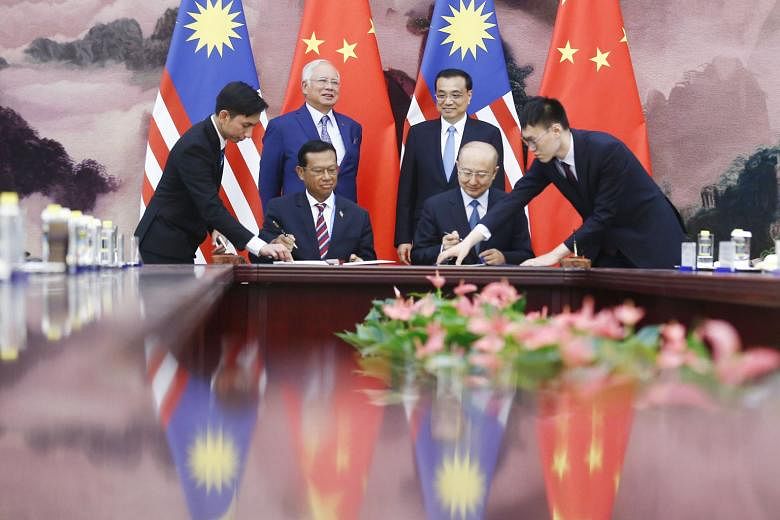The Philippines, and sometimes Vietnam, are often the focus in debates over China's designs on and claims over the South China Sea.
But a pattern is emerging that points to Malaysia as the budding linchpin in Beijing's strategy to dominate the South China Sea and trade among Asean.
In the past week, Malaysia's economic ties with China, which now range from property investments to infrastructure development, have shifted into the realm of geopolitics and security.
This change in tack surfaced during talks between Prime Minister Najib Razak and President Xi Jinping last week in Beijing, where both leaders pledged to explore a clutch of initiatives that could be formalised at their next meeting set to take place later this year in Malaysia.
The wish list, according to Malaysian government officials, includes:
- Ensuring China's lead role in developing the high-speed rail project that would not just involve linking Kuala Lumpur and Singapore but also a commitment to build a connection to Bangkok.
- A dedicated oil pipeline to service China's energy needs that would cut across peninsular Malaysia, running from Bagan Datuk on the coast of Perak in the Strait of Malacca to Bachok, the coastal town in the east-coast Kelantan state that faces the South China Sea.
- Joint explorations between China's state oil companies and Malaysia's national oil giant Petronas to exploit resources in overlapping territories in the South China Sea.
- And the development of a regional counterterrorism centre that would feature radar surveillance capabilities provided by China in the Johor state that neighbours Singapore.
All are sensitive wishes and the passage of these proposals is by no means assured, given the domestic and regional challenges Kuala Lumpur is likely to face. Nevertheless, these ambitious plans underscore China's desire to control the South China Sea and build leverage over the Malacca Strait.
There are a number of reasons behind China's current focus on Malaysia.
China already has virtual control over the Mekong, the region's most important inland waterway. Despite opposition from local fishermen in Thailand and Laos, Beijing is barrelling ahead with plans to dynamite a series of rapids and river islands to allow for the passage of 500-ton cargo ships.
The next step is to develop fresh infrastructure for land and sea to spread its influence in the 10-nation archipelagic Asean, which Beijing considers as its southern hinterland.
That's where Malaysia - which occupies one of the most strategic positions along the Strait of Malacca and South China Sea trade routes that carry over US$5.3 trillion (S$7.4 trillion) worth of global trade annually - fits in.
China is spearheading a number of port projects on the east and west coasts of peninsular Malaysia that will be connected by a RM55 billion (S$17.7 billion) rail link to create a land bridge that could significantly alter trade routes on the busy Strait of Malacca and the South China Sea that currently go via Singapore.
This proposed 620km electrified line will snake its way from Tumpat, which is located near Malaysia's north-eastern border with Thailand, down the coast to Kuantan Port, a stretch that houses Malaysia's main oil and gas facilities, before cutting through the mountainous central region to Port Klang, Malaysia's largest port fronting the Strait of Malacca.
Apart from infrastructure development, Chinese state-government companies and private interests are constructing steel plants, and manufacturing facilities producing locomotive and rolling stock for railway ventures and textiles, intended for export to the Asean markets and beyond.
China's growing presence in Malaysia is stoking domestic unease.
There are suggestions that the leaning towards China is a direct result of the fallout from the debacle at state-owned 1Malaysia Development Berhad, a brainchild of Datuk Seri Najib that is at the centre of a global money- laundering probe in several countries, including the US and Singapore.
China has not only ignored the international tarring of the Najib administration over the financial scandal, but has also stepped up to the plate to take over assets linked to 1MDB as part of a plan to help the state-owned entity deal with its mountain of debt.
Confidants of the Premier privately acknowledge the 1MDB link but they note that the China tilt is also part of a wider strategy by the Najib administration to deal with Malaysia's growing economic challenges.
A one-time regional manufacturing powerhouse, Malaysia is being buffeted by competition for limited foreign direct investment from other more competitive regional economic destinations, such as Indonesia and Vietnam. Lower revenues from oil and commodity exports have forced the government to make the difficult policy choices of slashing subsidies and imposing a goods and services tax that have led to sharp spikes in the cost of living.
By grafting on to China, Malaysia is hoping to generate new growth drivers that will help turn it into a key player in the wider Asean economic community.
The clutch of initiatives President Xi and Mr Najib discussed during the Beijing session last week spotlights the desire to deepen economic links between the two countries.
But what will grab more attention is how these ambitions are heavily laced with security and geopolitical drivers.
In particular, the proposal for a regional counterterrorism centre that will feature radar surveillance capabilities proposed by China may be too much for Malaysia's closest neighbours who want to ensure freedom in the movement of trade in the Strait of Malacca and the South China Sea.
How Mr Najib balances his country's deep embrace of China with Malaysia's long-term relationships within Asean will be closely followed in the coming months.


